动词详解+例句
非谓语动词详解+例句

The news reports that Cheng Yifei died several days ago.
Cheng Yifei is reported to have died several days ago.
【答案】A
【解析】
选A start与逻辑主语the lecture之间为主动关系,故排除B、D两项。不定式作定语时,常表示动作尚未发生,故排除C项,此处用现在分词作后置定语,表示主动。
第四步:根据与谓语动词的先后关系确定时态
非谓语动词表示的动作发生在谓语动词表示的动作之前用过去分词或v. ing形式/不定式的完成式;如果同时进行用v. ing形式或不定式的进行式;如果非谓语动词表示的动作发生在谓语动词表示的动作之后用不定式的一般式。
A.leadB.leading
C.ledD.to lead
【答案】B
【解析】
【详解】
考查非谓语动词。句意:看那边!有一条长长的蜿蜒小路通向那所房子。分析句式可知,这是个there be句型,因此,此处用非谓语动词,path与lead是主动关系,因此用现在分词,故选B。
3.Life is a journey _____with hardships, joys and special moments.
因此B选项正确。
句意为“有人认为他已做了一件傻事。现在应怪他自己丢掉这份工作。”
考点:考查动词非谓语形式。
5.After receiving the Oscar for Best Supporting Actress, Anne Benedict went onall the people who had helped in her career.
【英语】动词详解+例句

—No wonder she is always so energetic.
A.set asideB.put awayC.work outD.pick up
考点:考查动词短语辨析
4.A long road tests a horse’s strength and a long-term task ________ a man’s heart.
A.provesB.will proveC.is provingD.has proved
【答案】A
【解析】
试题分析:考查动词时态。句意:路遥知马力,日久见人心。这是一条谚语,故用一般现在时态,故选A。
考点:考查动词时态
5.He has behaved in the most extraordinary way; I can’this actions at all.
A.account forB.call forC.send forD.reach for
【答案】A
【解析】
考查动词短语。account for “解释”; call for“需要;要求”; send for“派人去请(拿);召唤”; reach for “伸手去拿”。由题意可知A项正确。
考点:考查动词辨析及固定搭配
3.These rules ________ new members only.
A.are applied toB.apply for
C.apply toD.are applied for
【答案】C
【解析】
试题分析:考查动词短语。短语apply to sb for sth向某人申请某物;apply to适用...;句意:这些规则只适用于新成员。根据句意可知C项正确。
动词的基本概念与用法
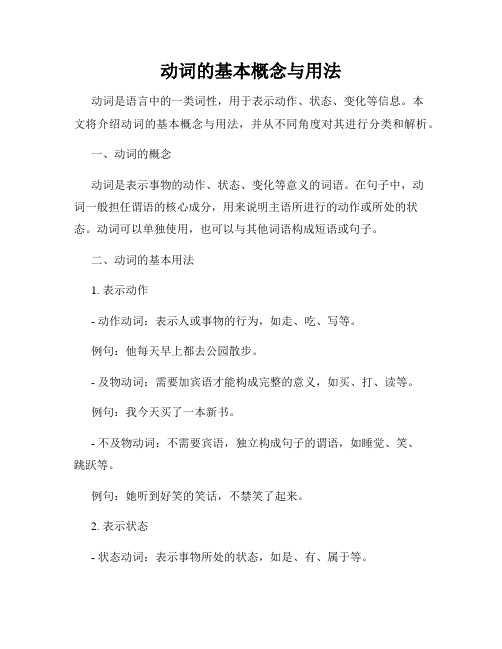
动词的基本概念与用法动词是语言中的一类词性,用于表示动作、状态、变化等信息。
本文将介绍动词的基本概念与用法,并从不同角度对其进行分类和解析。
一、动词的概念动词是表示事物的动作、状态、变化等意义的词语。
在句子中,动词一般担任谓语的核心成分,用来说明主语所进行的动作或所处的状态。
动词可以单独使用,也可以与其他词语构成短语或句子。
二、动词的基本用法1. 表示动作- 动作动词:表示人或事物的行为,如走、吃、写等。
例句:他每天早上都去公园散步。
- 及物动词:需要加宾语才能构成完整的意义,如买、打、读等。
例句:我今天买了一本新书。
- 不及物动词:不需要宾语,独立构成句子的谓语,如睡觉、笑、跳跃等。
例句:她听到好笑的笑话,不禁笑了起来。
2. 表示状态- 状态动词:表示事物所处的状态,如是、有、属于等。
例句:这个问题很复杂。
- 表示存在:表示事物存在的情况,如在、有等。
例句:我家里有一只小猫。
3. 表示变化- 变化动词:表示事物发生变化,如变成、变得等。
例句:他变得越来越自信。
- 关系动词:表示两者之间的关系,如是、有等。
例句:婚姻是一种美好的关系。
三、动词的时态和语态动词既可以表达时间的先后顺序,也可表示动作或状态的进行或完成。
1. 时态- 现在时态:表示现在或经常性的动作、状态或客观真理,如写、说等。
例句:他现在在写一篇短文。
- 过去时态:表示过去发生的动作或状态,如走、吃等。
例句:昨天我在公园里散步。
- 将来时态:表示将来要发生的动作或状态,如去、做等。
例句:明天我将去看电影。
2. 语态- 主动语态:表示主语执行动作的语态,如我吃饭、他唱歌等。
例句:我每天早上都吃饭。
- 被动语态:表示主语接受动作的语态,如饭被我吃、歌被他唱等。
例句:这首歌被他唱得很好听。
四、动词的形式变化动词在形式上会发生变化,根据时态、人称和数的差异,它们有不同的形式。
1. 时态变化动词的时态变化主要包括现在时、过去时和将来时的变形。
常用动词短语(附例句)解析

Phrasal Verbsaccountaccount for(tr)(为某事)给出充分的理由,圆满地解释(某种行为或某项支出),做出交代:A treasurer must account for the money he spends.财务负责人必须对他支付的款项做出交代。He has behavd in the most extraordinary way;I can’t account for hisactions at all/I can’t account for his behaving like that.他的行为极为奇怪,我完全无法解释他的行动/我无法为他那样的举动做出解释。allowallow for(tr)预先为某事留有余地,考虑到(常指某种额外的需要、支出、耽搁等):—It is 800 kilometres and I drive at 100 k.p.h., so I’ll be there in eighthours.—But you’ll have to allow for delays going through towns and for stopsfor refuelling.—距离是800公里,而我的车速是每小时100公里,因此我八小时后可以到那里。—可是你得把通过市镇和停车加油所耽搁的时间考虑进去。Allowing for depreciation your car should be worth£2,000 this timenext year.如果考虑到折旧,你的车明年此时应当值2,000英镑。answeranswer back(intr),answer somebody back反驳别人的责难,回嘴顶撞:Father:Why were you so late last night? You weren’t in till2 a.m.父亲:你昨晚回家为什么这么晚?你直到凌晨两点钟才回来。Son:You should have been asleep.儿子:那时候你本该睡着了。Father:Don’t answer me back.Answer my question.父亲:别跟我顶嘴。回答我的问题。askask after/for somebody 探询有关……的信息,(向第三者)问某人健康如何:I met Tom at the party;he asked after you.我在聚会上遇见了汤姆;他问你好。(问你健康如何/问你过得怎么样)ask for(a)寻找某人并想和他/她说话,要求见到某人:Go to the office and ask for my secretary.到办公室去,找我的秘书。(b)要求,索要:The men asked for more pay and shorter hours.工人们要求增加工资,减少工时。ask someone in(宾语在in之前)请某人进来:He didn’t ask me in;he kept me standing at the door while he read the message.他没有让我进去;他径自看那张条子,让我站在门口等着。ask someone out(宾语在out之前)请某人出去参加娱乐活动或吃饭(特别是在公众地方吃饭):She had a lot of friends and was usually asked out in the evenings,so she seldom spent an evening at home.她有很多朋友,晚上常被邀请外出,因此她晚上很少在家里呆着。backback away(intr)慢慢地退回去(因为遇到某种危险或不愉快的事):When he took a gun out everyone backd away nervously.他拿出枪来时,大家都紧张地向后退去。back out(intr)退出(某事先已同意的联合行动),停止或拒绝给予所允诺的帮助或支持:He agreed to help but backed out when he found how difficult it was.他本来同意给予帮助的,但在发现事情有多么困难之后就打退堂鼓了。back somebody up从道义上或行动上支持:The headmaster never backed up his staff.(backed them up)If a parentcomplained about a teacher he assumed that the teacher was in thewrong.校长从来不给教员们撑腰。凡是有家长给老师提意见时,他总是认为一定是老师不对。bebe against(tr)反对(常带动名词):I’m for doing nothing till the police arrive./I’m against doing anythingtill the police arrive.我赞成在警察来到以前不采取行动。/我反对在警察到来以前采取任何行动。be away(intr)(至少有一个晚上)不在家,不在某地be back(intr)在长期或短暂地离开之后回到原地:—I want to see Mrs Pitt.Is she in?—No,I’m afraid she’s out at the moment./No,I’m afraid she’s awayfor the weekend.—When will she be back?—She’ll be back in half an hour/next week.—我想见皮特夫人。她在吗?—不,恐怕她现在不在。/不,我想她外出度周末了。—她什么时候回来?—她半小时后/下周回来。be for(tr)赞成(常带动名词)be in(intr)在家或在某个建筑物内be in for(tr)将要遇上(常跟某种令人不愉快的事):Did you listen to the weather forecast? I’m afraid we’re in for a bumpyflight.你听气象预报没有?恐怕我们这次航班要很颠簸。If you think that the work is going to be easy you’re in for a shock.如果你以为这工作将容易,那么你可要大吃一惊了。be out(intr)短时间不在家/不在某个建筑物里,但并不在外过夜be over(intr)结束:The storm is over now;we can go on.暴风雨过去了;我们可以继续走了。be up(intr)起床了:Don’t expect her to answer the doorbell at eight o’clock on Sundaymorning.She won’t be up.星期日早上8点钟时,别指望她听见门铃响会来开门。她那时还没有起床呢。be up to(tr)体力或智力足以……(宾语常用it,但也可用动名词):After his illness the Minister continued in office though he was no longerup to the work/up to doing the work.部长生病后继续任职,但他已力不胜任了。be up to something/some mischief/some trick/no good从事或忙于某种调皮的、不正道的或有害的事/捣鬼:Don’t trust him;he is up to something/some trick.别信他;他在搞鬼/在耍诡计。The boys are very quiet.I wonder what they are up to.男孩子们无声无息了。我不知他们在捣什么鬼。注意:这里up to的宾语常是某一很不确定的词语,如上面例句所示。这个习语从来不与某一具体明确的事连用。it is up to someone(常带动词不定式)此事是某人的职责:It is up to the government to take action on violence.采取行动对付暴力行为,是政府职责所在。I have helped you as much as I can. Now it is up to you.我已尽我所能地帮助你了。现在该看你自己了。(你得靠自己的努力干下去。)bearbear out(tr)证实,提供证明:This report bears out my theory.(bears my theory out/bears it out)这报告证实了我的理论。bear up(intr)听到坏消息仍能勇敢支撑,掩饰感情或忧伤:The news of her death was a great shock to him but he bore up bravely and none of us realized how much he felt it.她故去的消息对他来讲是个打击,但他勇敢地支撑着,我们谁也没意识到他的感受该有多么强烈。blowblow out(tr)吹熄:The wind blew out the candle.(blew the candle out/blew it out)风吹灭了蜡烛。blow up(tr/intr)(a)用爆炸的方法毁灭,爆炸,被毁:They blew up the bridges so that the enemy couldn’t follow them.(blew the bridges up/blew them up)他们炸毁了桥,好让敌人不能追上他们。Just as we got to the bridge it blew up.我们刚到桥头,桥就炸掉了。(b)充气,打气,使膨胀:The children blew up their balloons and threw them into the air.( blew the balloons up/blew them up)孩子们把气球吹鼓了,扔向空中。boilboil away(intr)(液体)因沸腾而挥发完,熬干:I put the kettle on the gas ring and then went away and forgot about it.When I returned, the water had all boiled away and the flame had burnta hole in the kettle.我把壶放在煤气灶上,然后就走开把这事忘掉了。我回来时,水都烧干了,火把壶底烧出了一个窟窿。boil over(intr)(液体因沸腾而)溢到容器外面:The milk boiled over and there was a horrible smell of burning.牛奶潽了,烧糊的味道极为难闻。breakbreak down a door etc.用强力敲破或撞破:The firemen had to break down the door to get into the burning house.(break the door down/break it down)消防员不得不破门而入以便到着火的房子里边去。break down figures将一数目分别列在不同项目下以作进一步说明:You say that 10,000 people use this library.Could you break that downintoage-groups?你说有10,000人使用这所图书馆。你能否按年龄组将数字分解一下?(即说出有多少人是25岁以下的,有多少人是50岁以上的等等)break down(intr)由于有缺陷或强度不够而坏掉或不再正常运作:(a)常指人暂时感情支持不住:He broke down when telling me about his son’s tragic death.他向我谈到他儿子惨死的事时,不能自已了。(他失声痛哭了。)(b)指丧失精神上的抵抗力:At first he refused to admit his guilt but when he was shown the evidencehe broke down and confessed.起初他否认有罪,但给他看证据时,他招架不住而供认了。(c)指身体健康状况严重恶化:After years of overwork his health broke down and he had to retire.在多年劳累之后,他的身体垮了,只好退休。(d)常指机器坏了:The car broke down when we were driving through the desert and it tookus two days to repair it.我们驾车横越沙漠时,汽车坏了,花了两天才修好。(e)指交涉或谈判的破裂:The negotiations broke down because neither side would compromise.因为双方都不肯妥协,谈判破裂了。break in(intr), break into(tr)(a)用暴力强行进入:Thieves broke in and stole the silver.窃贼破门而入,偷走了银器。The house was broken into when the owner was on holiday.屋主外出度假时,有贼破门而入。(b)突然说话打断别人:I was telling them about my travels when he broke in with a story of hisown.我正在告诉他们我旅途中的事,他忽然插嘴讲起他自己的故事来。break in a young horse/pony etc.(tr)训练(马等)以供驾驭使用:You cannot ride or drive a horse safely before he has been broken in.在没有把马训练好以前,不管骑它还是用它驾车都是不安全的。break off(tr/intr)解开,破开,使分裂开或自己破裂开:He took a bar of chocolate and broke off a bit.(broke a bit off/broke itoff)他拿出一板巧克力,掰下了一小块。A piece of rock broke off and fell into the pool at the foot of the cliff.一块岩石断裂开,掉到悬崖脚下的池塘里。break off(tr)终止,停止,取消(常跟协议、协商或谈判等):Ann has broken off her engagement to Tom.(broken her engagement off/broken it off)安已经取消了同汤姆的婚约。break off(intr)突然停止说话,突然住口:They were in the middle of an argument but broke off when someonecame into the room.他们正争吵不休,但有人进屋时他们突然住口了。break out(intr)(a)开始,爆发(常用于诸如战争、流行病、火灾等不好的事):War broke out on 4 Angust.战争于8月4日爆发。(b)用暴力方法从监狱等地逃出:They locked him up in a room but he broke out.他们把他锁在一间屋里,可是他强行逃出了。(砸开门跑掉了)The police are looking for two men who broke out of prison last night.警方正在搜捕昨天晚上越狱逃跑的两名男子。break up(tr/intr)(使)瓦解,(使)解体:If that ship stays there she will break up/she will be broken up by thewaves. 那艘船如果停泊在那里,就会破的/会被浪头打散的。The old ship was towed away to be broken up and sold as scrap.那艘旧船被拖走以便拆散当废铁卖了。Divorce breaks up a lot of families.(breaks families up/breaks them up)离婚拆散了许多家庭。break up(intr)(用于学校的学期、会议、聚会等)散会,放假:The school broke up on 30 July and all the boys went home for the holi- days. 学校在7月30日放假了,男孩子们都回家度假去了。The meeting broke up in confusion.会议在一片混乱中散了。bringbring someone round(tr;宾语常位于round之前)(a)说服某人接受以前所反对的建议:After a lot of argument I brought him round to my point of view.在争辩了很久之后,我说服他转念同意了我的看法。(b)使恢复知觉:She fainted with the pain but a little brandy soon brought her round.她痛得昏厥了,但是一小点白兰地很快使她恢复了知觉。bring a person or thing round(tr;宾语常位于round之前)把人或物带到某人的住所去:I have finished that book that you lent me; I’ll bring it round(to yourhouse)tonight.你借给我的书我已经看完了;我今晚上把它带(到你家里)来。bring up(tr)(a)教育培养儿童:She brought up her children to be truthful.(brought her children up/brought them up)她教导她的孩子们要真诚无欺。(b)提起,谈到:At the last committee meeting,the treasurer brought up the question of raising the annual subscription.(brought the question up/brought it up)委员会上一次开会时,财务主管提出了提高会员年费的问题。burnburn down(tr/intr)(完全)焚毁(指建筑物):The mob burnt down the embassy.(burnt the embassy down/burnt it down)乱民把大使馆焚毁了。The hotel burnt down before help came.旅馆在援助到来以前就烧毁了。call1 call走访,拜访call at。走访一个地方:I called at the bank and arranged to transfer some money.我到银行去了一下,安排了款项过户的事宜。call for到一个地方去取物或接人:I am going to a pop concert with Tom.He is calling for me at eightso I must be ready then.我要和汤姆去听流行歌曲音乐会。他8点钟来接我,因此我必须届时准备好。Let’s leave our suitcases in the left luggage office and call for themlater on when we have the car.咱们可以把行李存放在行李暂存处,等以后有车用时再来取。call in(intr)同look in和口语化的drop in意思一样,是来访,来坐坐的意思:Call in/Look in on your way home and tell me how the interviewwent.你回家的路上来看我一下,告诉我面谈进行得如何。call on拜访某人:He called on all the housewives in the area and asked them to sign thepetition.他走访了这一地区的所有主妇,要求他们在请愿书上签名。2 call for/in/on的其他意思call for(tr)要求,需要(这里的主语常是一个不用来指人的单词或短语,如the situation形势/this sort of work这种工作/this此事等,宾语则常是一个表示某种性质的词,如courage勇气/patience耐心/a steady hand稳当不抖的手): The situation calls for tact.对付这一形势要有策略。You’ve got the job! This calls for a celebration.你得到这份工作了!这需要庆祝一下。但这里也可以用一个用来指人的主语:The workers are calling for strike action.工人们正要求采取罢工行动。The relations of the dead men are calling for an inquiry.死者们的亲属要求调查真相。call in a person/call a person in派人去找某人来/请某人来家服务(send for比call in更显得主语权势大,因此callin是更有礼貌的说法):It was too late to call in an electrician.(call an electrician i n/call him in)找电工来已太晚了。There is some mystery about his death; the police have been calledin.他的死有点儿蹊跷;已经去找警察来了。call on somebody(常带动词不定式)要某人做某事/要某人给予帮助(较为正式的提出要求的方式,主要用于正式场合或演讲中,意味着提出要求的人认为所号召的事是另一人的责任):The president called upon his people to make sacrifices for the good oftheir country.总统号召人民为祖国的利益做出牺牲。The chairman called on the secretary to read the minutes of the lastmeeting.主席要求秘书朗读上次会议的记录。3 call的其他词组call off(tr)取消尚未开始的事,放弃已在进行中的事:They had to call off the match as the ground was too wet to play on.(call the match off/call it off)因为场地太湿无法比赛,人们不得不取消这次比赛。When the fog got thicker the search was called off.雾愈来愈浓了,只得放弃了搜索。call out(tr)召唤某人出来处理外面的事(常用于指部队被召集走出营房对付民众骚乱):The police couldn’t control the mob so troops were called out.警察无法控制乱民,因此出动了军队。The Fire Brigade was called out several times on the night of 5 November to put out fires started by fireworks.11月5日晚上,消防队多次奉召出动,以扑灭因燃放焰火而引起的火灾。Doctors don’t much like being called out at night.医生们不太喜欢夜间出诊。call up(tr)(a)征去服兵役:In countries where there is conscription men are called up at the age of eighteen.(call up men/call men up/call them up)在实行征兵制的国家里,18岁的男子要应征服役。(b)给……打电话:I called Tom up and told him the news.(calld up Tom/called him up)我给汤姆打电话,把消息告诉他了。carenot to care about(tr)对……淡漠,不关心……:The professor said that he was interested only in research;he didn’t really care about students.教授说他只对研究感兴趣;他并不真的关心学生。care for(tr)(a)喜欢(很少用于肯定句):He doen’t care for films about war.他不喜欢战争影片。(b)照看(除被动态外,较少使用):The house looked well cared for(=had been well looked after/was ingood condition).房子看起来照管得很好。carrycarry on(intr)继续(常指工作或职责):I can’t carry on alone any longer;I’ll have to get help.我无法再一个人继续下去了;我得找人帮忙。carry on with(tr)与上用法相似:The doctor told her to carry on with the treatment.医生告诉她应该继续这种疗法。carry out(tr)履行(职责),服从(命令),执行(指令),(把威胁要做的事)付诸行动:You are not meant to think for yourself;you are here to carry out my or-ders.你们的职责不是自己思考;叫你们来这里是要你们执行我的命令。The Water Board carried out their threat to cut off our water supply.自来水公司董事会把他们的威胁付诸行动,停止供应我们水了。(他们威胁要这样做,也真的这样做了。)He read the instructions but he didn’t carry them out.他看了指示,但没有遵照执行。catchcatch up with(tr),catch up(tr/intr)赶上但没超过:I started last in the race but I soon caught up with the others.(caught themup/cautht up)我在赛跑中最后一个起跑,但不久就赶上了其他人。You’ve missed a whole term;you’ll have to work hard to catch up with the rest of the class.(catch them up/catch up)你缺了整整一学期的课,得努力学习以便赶上同班的其他人。cleanclean out(tr) a room/cupboard/drawer etc.彻底清理打扫(房间/碗柜/抽屉等):I must clean out the spare room.(clean the spare room out/clean it out)我得把那间备用房(客房)彻底清扫一下。clean up(tr) a mess, eg. anything spilt清扫(脏物,如撒出的东西):Clean up any spilt paint.(clean the spilt paint up/clean it up)如果有溅出来的油漆,把它收拾干净。clean up(intr)同上用法相同:These painters always clean up when they’ve finished.这几位油漆工完工之后总要把场地打扫干净。clearclear away(tr)把物件拿开以便腾出地方:Could you clear away these papers?(clear these papers away/clear them away)你能不能把这些文件清除开?clear away(intr)散开:The clouds soon cleared away and it became quite warm.云很快就散开了,天气变得相当暖和。clear off(intr)走开(指室外) clear out(intr)走开(指室内)二者都是口语用法;作为命令时这样说是相当不礼貌的:‘You clear off,’said the farmer angrily.‘You’ve no right to put your caravans in my field without even asking my permission.’“你们给我走开,”农民愤怒地说,“你们没有权利连我的许可都没征得就把住人的大篷车停在我的地里。”Clear out! If I find you in this building again,I’ll report you to the po-lice.走开!你要再到这幢建筑里来,我就将你报警了。clear out(tr)把(房间/碗柜/抽屉等)腾空以便放别的东西:I’ll clear out this drawer and you can put your things in it.( clear this drawer out/clear it out)我会把这个抽屉腾空,这样你就能把你的东西放在里面了。clear up(intr)有云或雨后天晴了:The sky looks a bit cloudy now but I think it will clear up.现在天看来有点阴,但我想天会晴的。clear up(tr/intr)收拾整齐干净:When you are cooking it’s best to clear up as you go,instead of leaving everything to the end and having a terrible pile of things to deal with.烹调时,最好是边干边收拾,而不要把活留到最后而剩下一大堆东西要打扫收拾。Clear up this mess.(clear this mess up/clear it up)把这堆乱糟糟的东西收拾干净。clear up(tr)(a)完成(某种尚待完成的工作):I have some letters which I must clear up before I leave tonight.有几封信我今天晚上走以前必须写完。(b)侦破(不可思议的怪事、案件等):In a great many detective stories when the police are baffled an amateurdetective comes along and clears up the mystery.(clears it up)在许多侦探小说中,当警察束手无策时,来了个业余侦探,把案子给破了。closeclose down(tr/intr)永远关闭,停业(指商店或买卖等):Trade was so bad that many small shops closed down and big shops closedsome of their branches down.(closed down some branches/closed themdown) 市面很差,许多小店停业了,大商店也关了一些分店。close in(intr)逼近,从四面凑近(常用于雾、夜色、敌人等):As the mist was closing in we decided to stay where we were.由于雾越来越逼近,我们决定留在原地不动。close up(intr)缩小间距(指一行人):If you children closed up a bit there’d be room for another one on thisseat.你们几个孩子要是挤一挤,这座位上还能加一个人。comecome across/upon(tr)碰巧发现,碰巧找到:When I was looking for my passport I came across these old photographs.我在找护照时碰巧找到了这些旧相片。come along/on(intr)和我一起来,陪伴我去(常用来敦促犹豫不决的人或拖拖拉拉的人):Come on,or we’ll be late.快点,否则我们要迟到了。come away(intr)(和我一起)走/离开:Come away now, It’s time to go home.快走吧。该回家了。come away/off(intr)自行脱落:When I pickd up the teapot the handle came away in my hand.我拿起茶壶时,茶壶掉了而只剩茶壶柄在我手里。come in(intr),come into( tr)进入:Someone knocked at my door and I said,‘Come in.’有人敲我的门,我说:“进来。”Come into the garden and I’ll show you my roses.到花园里来,我给你看我的玫瑰花。come off(intr)(a)(计划或阴谋)成功(用于否定句):I’m afraid that scheme of yours won’t come off.It needs more capitalthan you have available.恐怕你那个计划不会成功。它需要的投资不是你能拿得出来的。(b) 发生,按预先安排的那样发生:—When is the wedding coming off?—Next June.—婚礼什么时候举行?—6月份。如果我们说The duchess was to have opened the bazaar(公爵夫人本来是要为义卖主持开幕仪式的),我们的意思是说计划是那样订的,但没有实现(她本安排好要去为它揭幕,但后来不得不取消这一安排)。(c)(话剧、展览等)结束一轮演出或展出:‘Lady windermere’s Fan’is coming off next week.You’d better hurryif you want to see it.《少奶奶的扇子》下周要结束演出了。你要想看的话得抓紧点。come out(intr)(a)被揭露或发觉(这里的主语常是the truth真相/the facts事实/the whol story 全部内情等;并且一般指有关人士想竭力掩盖的事实即丑闻等):They deceived everybody till they quarrelled among themselves;then onepublicly denounced the others and the whole truth came out.他们把大家都骗了,直到后来内讧起来,其中一个人公开揭发了别人,这才真相大白。(b)(书籍)发行:Her new novel will be coming out in time for the Christmas sales.她的新小说将赶在圣诞节购物潮时发行。(c)(污渍)消除,洗掉:Tomato stains don’t usually come out.西红柿污渍一般洗不净。come round(intr)(a)终于接受以前所反对的建议:Her father at first refused to let her study abroad but he came round(to it)in the end.她父亲起初反对她去外国念书,但终于回心转意了。(他说可以让她去。)(b)到某人的家里来:I’ll come round after dinner and tell you the plan.我晚饭后来转一下,把计划说给你听。come round/to(intr;to重读) 恢复知觉:When we found him he was unconscious but he came round/to in half anhour and explained that he had been attacked and robbed.我们发现他时他已失去知觉,但是半小时后他恢复了知觉,说他遭到殴打抢劫。come up(intr)(a) 升到水面,生长出来:A diver with an aqualung doesn’t have to keep coming up for air;he canstay underwater for quite a long time.备有潜水供氧器的潜水员无需不断升出水面呼吸;他可以在水下停留相当长的时间。Weeds are coming up everywhere.杂草到处蔓生。(b)被提到:The question of the caretaker’s wages came up at the last meeting.在上次会议中提到了看楼人的工资问题。come up(intr),come up to(tr)走近,来到能说话的近处:A policeman was standing a few yards away.He came up to me and said,‘You can’t park here.’几码外站着一位警察。他走过来并对我说:“你不能把车子停放在这里。”cropcrop up(intr)出现,意外地或偶然地出现(主语常是一个抽象名词如difficulties 困难/the subject题目或是一个代词):At first all sorts of difficulties cropped up and delayed ter we learnthow to anticipate these.起初冒出来了各式各样的困难,耽搁了我们。后来我们学会了如何为这些困难预作准备。cutcut down a tree 砍倒树木:If you cut down all the trees you will ruin the land.(cut the trees down/ cut them down)你要是砍倒所有的树木,就会把土地给毁了。cut down(tr) 减少数量:We must cut down expenses or we’ll be getting into debt.我们得减少支出,否则就要负债了。‘This article is too long,’said the editor.‘Could you cut it down to2,000 words?’“这篇文章太长了,”编辑说,“你能不能把它缩到两千字?”cut in(intr)在车距极近的不安全情况下并行抢道并插到另一辆车前面:Accidents are often caused by drivers cutting in.车祸常由司机抢道插到别的车前面而引起。cut off(tr)切断、停止供应(宾语可以是水、电、煤气,也可以是被停供的人):The Company has cut off our electricity supply because we haven’t paidour bill.(cut our supply off/cut it off)因为我们没有付电费,公司断了我们的电。They’ve cut off the water/our water supply temporarily because they arerepairing one of the main pipes.他们暂时断了我们的水源,因为在修其中的一条主要的水管。We were cut off in the middle of our(telephone)conversation.我们(电)话还没完,就被掐断了。(这可能是偶然的事,也可能是电话接线员故意的行为。)cut someone off阻挡某人使其不能逃到安全地带(常用于指潮水围困,特别是用被动态时):We were cut off by the tide and had to be rescued by boat.我们被潮水困住了,只好由小船搭救出来。be cut off(intr)被隔绝在不方便的地方(主语常是某一地方或住在某一地方的人):You will be completely cut off if you go to live in that village becausethere is a bus only once a week.你要是去住在那个村里,就会与世隔绝了,因为那里每周只有一班公共汽车。cut out(tr)(a)从布、纸等上弄下所需形状:When I am making a dress I mark the cloth with chalk and then cut itout.(cut out the dress/cut the dress out)我缝衣服时先用白粉在布上画出样子,然后再剪下。Young people often cut out photographs of their favourite pop stars andstick them to the walls.年轻人常把最喜欢的流行歌手的相片剪下来贴在墙上。(b)略去,排除,不再继续:If you want to get thin you must cut out sugar.(cut it out)你要是想瘦点,就得不吃糖。be cut out for(tr)特别适合于……(用于指人,又常用于否定句中):His father got him a job in a bank but it soon became clear that he wasnot cut out for that kind of work.他爸爸给他在银行里找了一个工作,但是不久就可以清楚地看出来,他不适合干那种工作。cut up(tr) 切、割、剪成碎片:They cut down the tree and cut it up for firewood.(cut the tree up/cut up the tree)他们把树砍倒并劈碎当柴火了。diedie away(intr)(声音)逐渐微弱直到听不到:They waited till the sound of the guard’s footsteps died away.他们一直等到警卫的脚步声消逝了。die down(intr)逐渐平静下来,直至平息(常指骚乱、火、心情的一阵波动等):When the excitement had died down the shopkeepers took down theirshutters and reopened their shops.波动平息后,店主们取下了窗板,重新开店营业。die out(intr)绝灭,成为过去(常指风俗、种族、动物品种等):Elephants would die out if men could shoot as many as they wished.如果人们爱猎杀多少大象就可以猎杀多少,大象就会灭种了。dodo away with(tr)废除:。
常见动词的用法(一)

常见动词的用法(一)常见动词的用法介绍在英语中,动词是句子的重要成分,用于表达动作、状态和存在等含义。
掌握常见动词的用法对于学习和使用英语来说至关重要。
本文将列举一些常见动词的用法,并对其进行详细讲解。
1. be(是/在)•用法一:用作连接动词,连接主语和表语(形容词、名词、副词等)。
–例句:I am happy.(我很快乐。
)•用法二:用于表达存在,表示某人或某物的存在。
–例句:There is a book on the table.(桌子上有本书。
)2. have(有/吃/持有)•用法一:用作实义动词,表示具有某种东西、从事某种行为或享受某种经验。
–例句:She has a car.(她有一辆车。
)•用法二:用作情态动词,表示“必须/应该”。
–例句:You have to finish your homework.(你必须完成你的作业。
)3. do(做)•用法一:用作实义动词,表示进行或完成某个动作。
–例句:What are you doing?(你在做什么?)•用法二:用作助动词,帮助构成疑问句和否定句。
–例句:Do you like ice cream?(你喜欢冰淇淋吗?)4. go(去/进行)•用法一:用作实义动词,表示移动到某个位置或进行某个活动。
–例句:We are going to the park.(我们要去公园。
)•用法二:用作情态动词,表示“可以/会”。
–例句:I can go swimming tomorrow.(明天我可以去游泳。
)5. make(制作/做/使)•用法一:用作实义动词,表示制作、做或创建某物。
–例句:She made a cake for her birthday.(她为自己的生日做了一个蛋糕。
)•用法二:用作情态动词,表示“强迫/使得”。
–例句:The teacher makes the students study hard.(老师让学生们努力学习。
不规则动词的例句分析
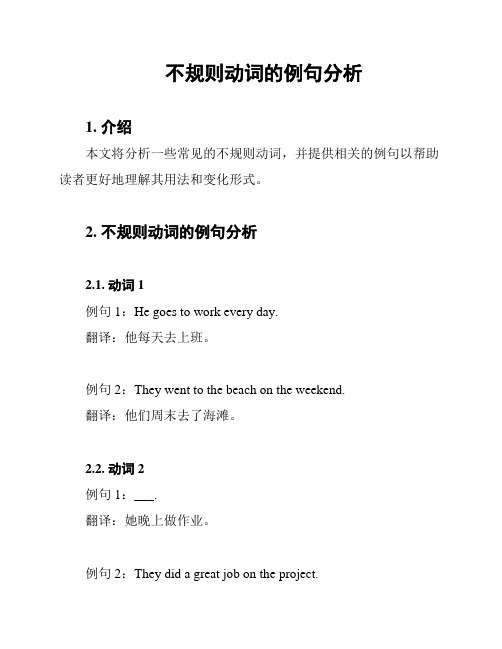
不规则动词的例句分析
1. 介绍
本文将分析一些常见的不规则动词,并提供相关的例句以帮助读者更好地理解其用法和变化形式。
2. 不规则动词的例句分析
2.1. 动词1
例句1:He goes to work every day.
翻译:他每天去上班。
例句2:They went to the beach on the weekend.
翻译:他们周末去了海滩。
2.2. 动词2
例句1:___.
翻译:她晚上做作业。
例句2:They did a great job on the project.
翻译:他们在这个项目上做得很好。
2.3. 动词3
例句1:I have a dog.
翻译:我有一只狗。
例句2:She had a nice car, but she sold it.
翻译:她以前有一辆不错的车,但是卖掉了。
2.4. 动词4
翻译:他说他会来参加派对。
例句2:She said she didn't like the movie.
翻译:她说她不喜欢这部电影。
2.5. 动词5
例句1:I make ___.
翻译:我每天早上做早餐。
例句2:They made a n to start their own business.
翻译:他们决定开始自己的生意。
3. 总结
本文提供了一些不规则动词的例句,希望读者通过例句能更好地掌握这些动词的用法和变化形式。
请注意,不规则动词的变化形式在不同时态和人称下可能会有所不同,需要根据具体语境进行适当的变化。
英语十大动词介绍
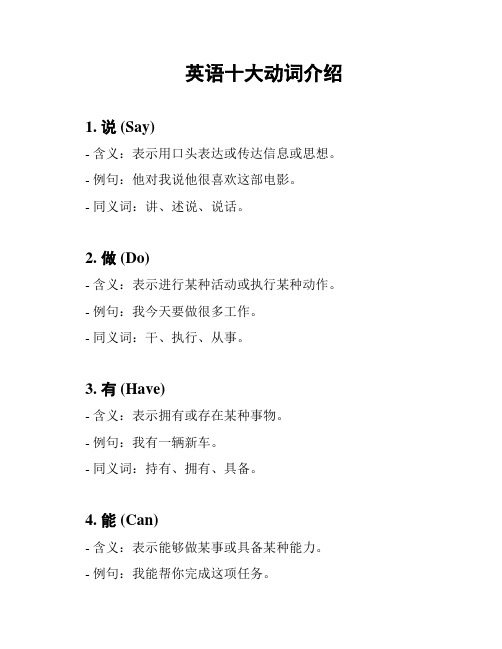
英语十大动词介绍1. 说 (Say)- 含义:表示用口头表达或传达信息或思想。
- 例句:他对我说他很喜欢这部电影。
- 同义词:讲、述说、说话。
2. 做 (Do)- 含义:表示进行某种活动或执行某种动作。
- 例句:我今天要做很多工作。
- 同义词:干、执行、从事。
3. 有 (Have)- 含义:表示拥有或存在某种事物。
- 例句:我有一辆新车。
- 同义词:持有、拥有、具备。
4. 能 (Can)- 含义:表示能够做某事或具备某种能力。
- 例句:我能帮你完成这项任务。
- 同义词:可以、有能力、会。
5. 去 (Go)- 含义:表示离开或移动到某个地方。
- 例句:我经常去公园散步。
- 同义词:走、去往、前往。
6. 得到 (Get)- 含义:表示获得或取得某种事物。
- 例句:他终于得到了他一直想要的工作。
- 同义词:取得、获得、收到。
7. 看 (See)- 含义:表示用眼睛观察或察看某物。
- 例句:我看到了一只小猫在花园里玩耍。
- 同义词:观看、望、瞧。
8. 知道 (Know)- 含义:表示了解或掌握某种信息。
- 例句:我知道今天是你的生日。
- 同义词:理解、认识、晓得。
9. 想 (Think)- 含义:表示思考或认为某事。
- 例句:我想明天会下雨。
- 同义词:思考、考虑、认为。
10. 爱 (Love)- 含义:表示深情地喜欢或在感情上关心某人或某物。
- 例句:我爱我的家人。
- 同义词:喜爱、热爱、钟爱。
以上是英语中的十个常用动词介绍。
这些动词在交流和写作中非常常见,对于研究和使用英语语言至关重要。
同时,通过合适的方式练和应用这些动词,可以提升英语表达的准确性和流畅度。
注意:以上解释仅供参考,语境和用法可能有所变化。
六大类系动词语法精解及例句
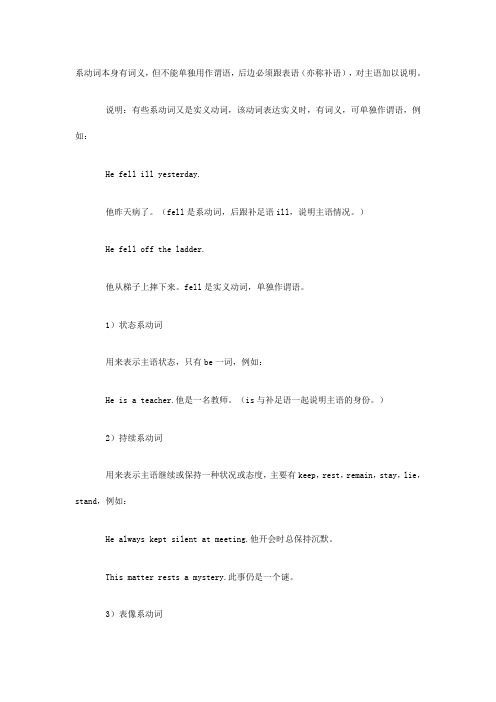
系动词本身有词义,但不能单独用作谓语,后边必须跟表语(亦称补语),对主语加以说明。
说明:有些系动词又是实义动词,该动词表达实义时,有词义,可单独作谓语,例如: He fell ill yesterday.他昨天病了。
(fell是系动词,后跟补足语ill,说明主语情况。
)He fell off the ladder.他从梯子上摔下来。
fell是实义动词,单独作谓语。
1)状态系动词用来表示主语状态,只有be一词,例如:He is a teacher.他是一名教师。
(is与补足语一起说明主语的身份。
)2)持续系动词用来表示主语继续或保持一种状况或态度,主要有keep,rest,remain,stay,lie,stand,例如:He always kept silent at meeting.他开会时总保持沉默。
This matter rests a mystery.此事仍是一个谜。
3)表像系动词用来表示"看起来像"这一概念,主要有seem,appear,look,例如:He looks tired.他看起来很累。
He seems (to be)very sad.他看起来很伤心。
4)感官系动词感官系动词主要有feel,smell,sound,taste,例如:This kind of cloth feels very soft.这种布手感很软。
This flower smells very sweet.这朵花闻起来很香。
5)变化系动词这些系动词表示主语变成什么样,变化系动词主要有become,grow,turn,fall,get,go,come,run.例如:He became mad after that.自那之后,他疯了。
She grew rich within a short time.她没多长时间就富了。
6)终止系动词表示主语已终止动作,主要有prove,trun out,表达"证实","变成"之意,例如:The rumor proved false.这谣言证实有假。
非谓语动词详解+例句

非谓语动词详解+例句一、单项选择非谓语动词1.New York is the fashion capital of the world, says a new study on Feb 4. 2014 by the Global Language Monitor (GLM), Pairs second, with Shanghai 10th while Hongkong 20th.A. coming, ranksB. come, rankedC. comes, rankingD. coming, ranking【答案】D【解析】D考查非谓语动词。
句意:2月4 口的一项新研究表明,纽约是世界的时尚之都。
2014年全球语言监测机构(GLM)排名第二,上海排名第10,香港排名第20。
Come和Pair是主动关系用动词ing形式,rank与Shanghai是主动关系,用动词ing形式,故选D。
2.I'm afraid that I can't attend Tom's wedding party next weekend.A. to be heldB. being heldC. heldD. is to be held【答案】A【解析】试题分析:考查非谓语动词作定语。
句子中已经有了谓语can't attend,故此处应填非谓语动词,首先排除D。
hold与party构成被动关系,但ABC答案均表被动。
因此再根据时间状语next weekend可确定填不定式表将来,故选A。
考查非谓语动词作定语时,要注意看与所修饰名词之间的关系,判断是主动还是被动。
同时还要注意从时间上判定,不定式作定语表将来,现在分词表进行,过去分词表完成。
考点:考查非谓语动词作定语。
3.that she was going off to sleep, I asked if she/d like that little doll on her bed.A. SeeingB. To seeC. SeeD. Seen【答案】A【解析】考查非谓语动词的用法。
非谓语动词详解+例句
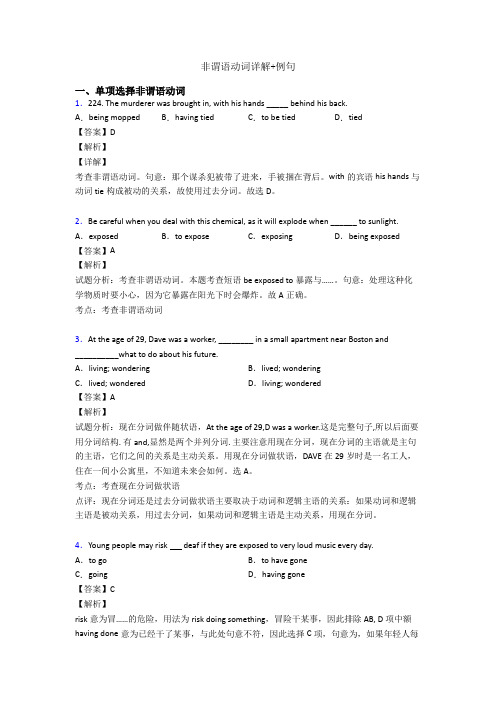
非谓语动词详解+例句一、单项选择非谓语动词1.224. The murderer was brought in, with his hands _____ behind his back.A.being mopped B.having tied C.to be tied D.tied【答案】D【解析】【详解】考查非谓语动词。
句意:那个谋杀犯被带了进来,手被捆在背后。
with的宾语his hands与动词tie构成被动的关系,故使用过去分词。
故选D。
2.Be careful when you deal with this chemical, as it will explode when ______ to sunlight. A.exposed B.to expose C.exposing D.being exposed【答案】A【解析】试题分析:考查非谓语动词。
本题考查短语be exposed to暴露与……。
句意:处理这种化学物质时要小心,因为它暴露在阳光下时会爆炸。
故A正确。
考点:考查非谓语动词3.At the age of 29, Dave was a worker, ________ in a small apartment near Boston and__________what to do about his future.A.living; wondering B.lived; wonderingC.lived; wondered D.living; wondered【答案】A【解析】试题分析:现在分词做伴随状语,At the age of 29,D was a worker.这是完整句子,所以后面要用分词结构. 有and,显然是两个并列分词. 主要注意用现在分词,现在分词的主语就是主句的主语,它们之间的关系是主动关系。
用现在分词做状语,DAVE在29岁时是一名工人,住在一间小公寓里,不知道未来会如何。
情态动词的用法总结及例句解析
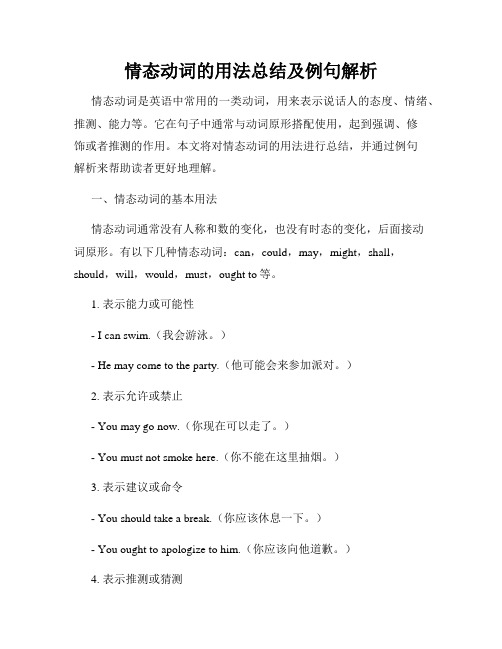
情态动词的用法总结及例句解析情态动词是英语中常用的一类动词,用来表示说话人的态度、情绪、推测、能力等。
它在句子中通常与动词原形搭配使用,起到强调、修饰或者推测的作用。
本文将对情态动词的用法进行总结,并通过例句解析来帮助读者更好地理解。
一、情态动词的基本用法情态动词通常没有人称和数的变化,也没有时态的变化,后面接动词原形。
有以下几种情态动词:can,could,may,might,shall,should,will,would,must,ought to等。
1. 表示能力或可能性- I can swim.(我会游泳。
)- He may come to the party.(他可能会来参加派对。
)2. 表示允许或禁止- You may go now.(你现在可以走了。
)- You must not smoke here.(你不能在这里抽烟。
)3. 表示建议或命令- You should take a break.(你应该休息一下。
)- You ought to apologize to him.(你应该向他道歉。
)4. 表示推测或猜测- He could be there.(他可能在那里。
)- It might rain tomorrow.(明天可能会下雨。
)5. 表示义务或必须- We must finish the project on time.(我们必须按时完成这个项目。
)- You ought to help him.(你应该帮助他。
)二、情态动词的细分用法除了以上的基本用法外,情态动词还有一些特殊的用法,需要注意其具体含义和用法。
1. can 和 could- 表示能力和技能:I can play the piano.(我会弹钢琴。
)- 表示请求或许可:Can I use your computer?(我可以用你的电脑吗?)- could 还可以用来表示过去的能力或许可:When I was young, I could run very fast.(小时候,我跑得很快。
初中英语动词讲解及例句

3、can只有现在 时和过去时,其 他时态要用 be able to。
教学资料整理
• 仅供参考,
I live in Beijing with my mother. 我 和我妈妈住在北京。live,住 It has a round face.(它有一张圆 脸。)has,有
连系动词
连系动词是表示主语“是什么”或 “怎么样”的词,它虽有词义,但 不完整,所以不能单独作谓语,必 须跟表语一起构成合成谓语, 例如:We are in Grade Two this year. 今年我们在两年级.are,是 are 这个词的词义“是”在句子中常 常不译e, could, might等。它们不能单独作谓语, 必须与行为动词(原形)一起作 谓语,表示完整的意思,
例如:
He can’t walk because he is a baby.(因为他是个婴 儿,不会走路。)can’t, 不 必 May I come in?(我可以 进来吗?)may, 可以
表示“感觉”的词,如look(看 起来),feel(觉得,摸起来), smell(闻起来),sound(听起 来),taste(尝起来) 表示“变”、“变成”的意思的 词,如become, get, grow, turn, 都解释为“变”、“变得”,
它们既可以作为行为动词,又可 以作为连系动词look,fell,smell
He can borrow some books from the library.(他可以从图书
馆借到一些书。)can, 可以 2、I run fast.(我跑得快。) I can’t run fast(我跑得不快。)
can’t, 不会,不能
3、Must he go now(他必须现 在走吗?)must, 必须
英语140个基础动词及例句
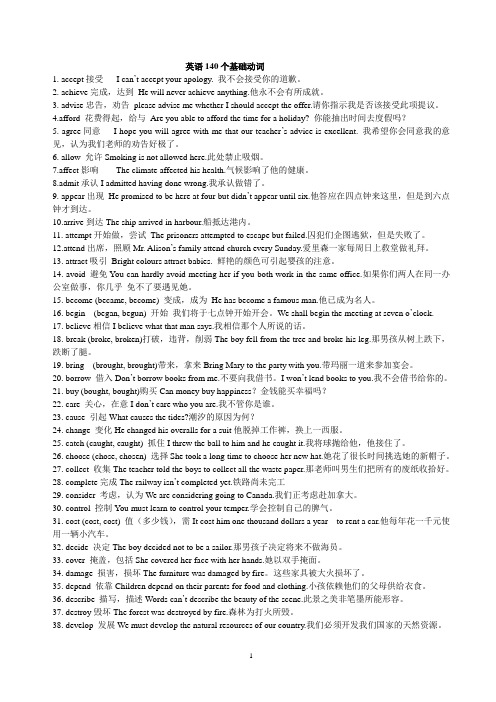
英语140个基础动词1. accept接受I can’t accept your apology. 我不会接受你的道歉。
2. achieve完成,达到He will never achieve anything.他永不会有所成就。
3. advise忠告,劝告please advise me whether I should accept the offer.请你指示我是否该接受此项提议。
4.afford 花费得起,给与Are you able to afford the time for a holiday? 你能抽出时间去度假吗?5. agree同意I hope you will agree with me that our teacher’s advice is excellent. 我希望你会同意我的意见,认为我们老师的劝告好极了。
6. allow 允许Smoking is not allowed here.此处禁止吸烟。
7.affect影响The climate affected his health.气候影响了他的健康。
8.admit承认I admitted having done wrong.我承认做错了。
9. appear出现He promised to be here at four but didn’t appear until six.他答应在四点钟来这里,但是到六点钟才到达。
10.arrive到达The ship arrived in harbour.船抵达港内。
11. attempt开始做,尝试The prisoners attempted to escape but failed.囚犯们企图逃狱,但是失败了。
12.attend出席,照顾Mr. Alison’s family attend church every Sunday.爱里森一家每周日上敎堂做礼拜。
13. attract吸引Bright colours attract babies. 鲜艳的颜色可引起婴孩的注意。
情态动词详解+例句

【解析】
【详解】
考查情态动词+have done。句意:“昨晚10点左右你给我打了电话,是吗?”“不,我没给你打电话。一定是别人干的。” must have done是对过去发生的动作最有把握的猜测,意思是“一定”,结合语境可知,我没有打电话给你,因此猜测一定有别人给你打了电话。故选A项。
Somebody must have stolen the ring.肯定有人偷了这枚戒指. [该句所推断的偷窃动作发生在过去.]
The temperature must have dropped to below zero last night, because the water is frozen all over.昨夜的温度肯定降到零度以下,因为水都冻住了。
A.willB.need
C.canD.must
【答案】D
【解析】
【详解】
考查情态动词表推测。句意:房间如此干净,他一定是昨天晚上打扫过了。must have done表示对过去发生的事情有把握的猜测,意思是“一定(做过)”,故D项正确。
4.— Excuse me, do you mind if I open the window?
— Well, if you__________. I can put on more clothes.
A.canB.may
C.mustD.shall
【答案】C
【解析】
【详解】
考查情态动词。句意:-不好意思,我把窗户打开你介意吗?-好吧,如果你必须这么做的话。我可以多穿点衣服。A. can能够;B. may可能;C. must一定;必须;D. shall会;将。must表示偏要,必须要做的事情,故选C。
动名词非谓语动词详解
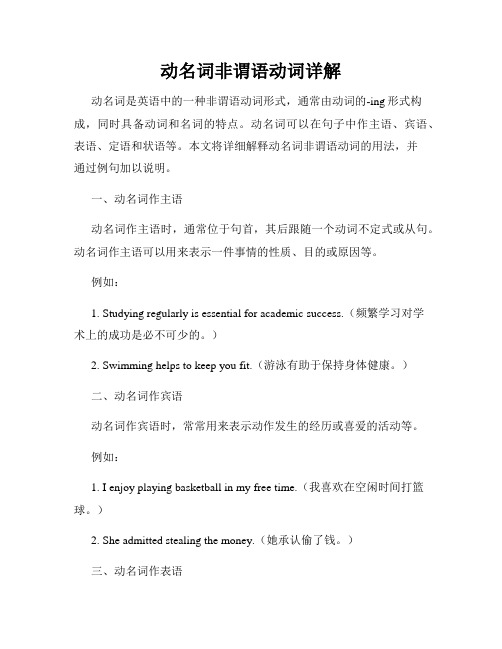
动名词非谓语动词详解动名词是英语中的一种非谓语动词形式,通常由动词的-ing形式构成,同时具备动词和名词的特点。
动名词可以在句子中作主语、宾语、表语、定语和状语等。
本文将详细解释动名词非谓语动词的用法,并通过例句加以说明。
一、动名词作主语动名词作主语时,通常位于句首,其后跟随一个动词不定式或从句。
动名词作主语可以用来表示一件事情的性质、目的或原因等。
例如:1. Studying regularly is essential for academic success.(频繁学习对学术上的成功是必不可少的。
)2. Swimming helps to keep you fit.(游泳有助于保持身体健康。
)二、动名词作宾语动名词作宾语时,常常用来表示动作发生的经历或喜爱的活动等。
例如:1. I enjoy playing basketball in my free time.(我喜欢在空闲时间打篮球。
)2. She admitted stealing the money.(她承认偷了钱。
)三、动名词作表语动名词作表语时,常用来表示主语具备的特征或状态。
例如:1. His favorite activity is dancing.(他最喜欢的活动是跳舞。
)2. The most important thing is staying positive.(最重要的是保持积极。
)四、动名词作定语动名词作定语时,通常位于名词之前,用来修饰名词。
例如:1. I bought a running shoe.(我买了一双跑鞋。
)2. The laughing girl caught everyone's attention.(那个笑着的女孩吸引了所有人的注意。
)五、动名词作状语动名词作状语时,通常位于句子中,用来修饰谓语动词,表示动作的目的、原因、方式、时间、结果等。
例如:1. He went to the library for studying.(他去图书馆是为了学习。
50个常用的英语动词以及简单的例句

50个常用的动词以及简单的例句:Run (跑步) - She likes to run in the park.Eat (吃) - They eat breakfast together every morning.Drink (喝) - He drinks coffee to wake up in the morning.Write (写) - She writes a novel in her free time.Read (读) - He reads a book every night before bed.Watch (看) - They like to watch movies on the weekends.Listen (听) - He enjoys listening to music while working.Speak (说话) - She speaks three languages fluently.Study (学习) - The students study for their exams.Dance (跳舞) - She loves to dance.Play (玩) - The children play in the park every day.Work (工作) - She works at a company downtown.Drive (开车) - He likes to drive his car on the weekends.Cook (烹饪) - She is a great cook and loves to make delicious food. Sing (唱歌) - He has a beautiful voice and likes to sing.Travel (旅行) - They love to travel and see new places.Sleep (睡觉) - He needs to get at least 8 hours of sleep every night. Jump (跳) - The kids love to jump on the trampoline.Swim (游泳) - She goes to the pool to swim every day.Fly (飞) - They enjoy flying to different countries for vacation. Laugh (笑) - They like to laugh and have a good time together.Smile (微笑) - She always smiles and makes everyone feel happy. Cry (哭) - The baby is crying and needs to be comforted.Hug (拥抱) - They give each other a hug to show their love. Kiss (亲吻) - They kiss each other goodbye before leaving. Wave (挥手) - He waves to his friends as they leave.Clap (鼓掌) - The audience claps to show their appreciation. Bow (鞠躬) - She bows to show respect.Cheer (欢呼) - The crowd cheers as the team scores.Shout (大喊) - He shouts for help when he sees a fire.Walk (走路) - They like to walk in the park on nice days.Fly (飞) - The bird flies from tree to tree.Ride (骑) - She loves to ride her bike in the park.Climb (爬) - The children climb the jungle gym.Slide (滑) - They love to slide down the playground slide. Swing (摇摆) - The child swings on the swings.Dig (挖) - He likes to dig in the garden.Plant (种植) - She loves to plant flowers and vegetables.Water (浇水) - He waters the plants every day.Pick (采摘) - They pick strawberries in the field.Paint (绘画) - She paints a beautiful picture.Draw (画) - He likes to draw in his spare time.Color (涂色) - The children love to color in coloring books. Cut (切) - She cuts the vegetables for dinner.Sew (缝纫) - She loves to sew and make her own clothes. Knit (编织) - She knits a warm scarf for winter.Build (建造) - He builds a birdhouse.Fix (修理) - He fixes the broken bike.Clean (清洁) - She cleans the house every week. Organize (整理) - He organizes his closet every few months.。
动词详解+例句
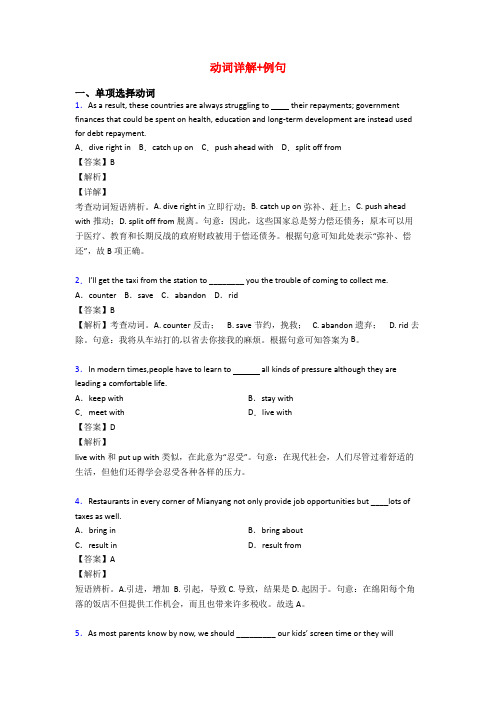
动词详解+例句一、单项选择动词1.As a result, these countries are always struggling to their repayments; government finances that could be spent on health, education and long-term development are instead used for debt repayment.A.dive right in B.catch up on C.push ahead with D.split off from【答案】B【解析】【详解】考查动词短语辨析。
A. dive right in立即行动;B. catch up on弥补、赶上;C. push ahead with推动;D. split off from脱离。
句意:因此,这些国家总是努力偿还债务;原本可以用于医疗、教育和长期反战的政府财政被用于偿还债务。
根据句意可知此处表示“弥补、偿还”,故B项正确。
2.I’ll get the taxi from the s tation to ________ you the trouble of coming to collect me. A.counter B.save C.abandon D.rid【答案】B【解析】考查动词。
A. counter反击; B. save节约,挽救; C. abandon遗弃; D. rid去除。
句意:我将从车站打的,以省去你接我的麻烦。
根据句意可知答案为B。
3.In modern times,people have to learn to all kinds of pressure although they are leading a comfortable life.A.keep with B.stay withC.meet with D.live with【答案】D【解析】live with和put up with类似,在此意为“忍受”。
情态动词详解+例句

情态动词详解+例句一、单项选择情态动词1.You ________ give me a lift. I want to walk home for exercise.A.needn’t B.couldn’t C.can’t D.mustn’t【答案】A【解析】【详解】考查情态动词。
句意:你不必让我搭车。
我想步行回家锻炼身体。
A. needn’t不必;B. couldn’t不能;C. can’t不会;D. mustn’t禁止,不允许。
根据I want to walk home for exercise.可知,你不必让我搭车。
故选A。
考点:考查情态动词2.They were abroad during the months when we were carrying out the investigation, or they __________to our help.A.would have come B.could comeC.have come D.had come【答案】A【解析】试题分析:本句考查的是一个含蓄的虚拟条件句,句中的or相当于if they had not gone abroad.因为前面句中使用的是were,说明这个虚拟语气是与过去事实相反,所以主句中使用的是“情态动词+have done”的形式。
句意:当我们在做调查的那几个月里,他们一直在国外,否则的话他们早就来帮助我们了。
故A正确。
3.Keep up your spirits even if you _____ fail hundreds of times.A.must B.needC.may D.should【答案】C【解析】【详解】考查情态动词。
A. must必须;B. need需要;C. may可能,或许;D. should应该。
句意:即使失败了几百次,也要振作起来。
此处表示一种不确定的推测,故选C。
4.--- Oh, my God! I just missed the last bus back home.--- That’s really bad. I’m sure you ______ it, but you just didn’t hurry up.A.had caught B.could have caught C.could catch D.can catch【答案】B【解析】【详解】考查情态动词+have done结构。
- 1、下载文档前请自行甄别文档内容的完整性,平台不提供额外的编辑、内容补充、找答案等附加服务。
- 2、"仅部分预览"的文档,不可在线预览部分如存在完整性等问题,可反馈申请退款(可完整预览的文档不适用该条件!)。
- 3、如文档侵犯您的权益,请联系客服反馈,我们会尽快为您处理(人工客服工作时间:9:00-18:30)。
动词详解+例句一、单项选择动词1.Forty years after China started its reform and opening﹣up, more than 18million rural residents have _________ poverty in South China's Guangxi Zhuang Autonomous Region.A.shaken off B.taken offC.paid off D.kicked off【答案】A【解析】【详解】考查动词短语辨析。
A. shaken off摆脱;B. taken off脱下;C. paid off付清;D. kicked off开赛。
句意:改革开放40年来,广西壮族自治区有1800多万农村人口脱贫。
根据句意可知此处表示“摆脱”,故A项正确。
2.Briggs will ________ as general manager when Mitchell retires.A.get away B.take overC.set off D.run out【答案】B【解析】试题分析:句意:当米切尔退休的时候,布里格斯将接管总经理的位置。
when Mitchell retires 这是时间状语从句,不能用将来时,而用一般现在时来代替;get away离开; take over接管;set off出发;run out用完,耗尽。
根据句意故选B。
考点:考查动词短语辨析。
3.As nobody here knows what is wrong with the machine, we must send for an engineer to_________ the problem.A.handle B.raiseC.face D.present【答案】A【解析】考查动词辨析。
A. handle“解决 = settle;(用手)抓/拿/碰”;B. raise“提出;使…上升”;C.face“面对;面朝”;D. present“提出;授予”,该句句意:“因为这儿没人知道这台机器哪儿出了毛病,所以我们必须去请一位工程师来‘解决’这个问题。
”,故正确答案为A.考点:动词辨析4.Restaurants in every corner of Mianyang not only provide job opportunities but ____lots of taxes as well.A.bring in B.bring aboutC.result in D.result from【答案】A【解析】短语辨析。
A.引进,增加 B. 引起,导致 C. 导致,结果是 D. 起因于。
句意:在绵阳每个角落的饭店不但提供工作机会,而且也带来许多税收。
故选A。
5.To get promoted, I must _____ my colleagues, who are committed to their jobs.A.take after B.take to C.take in D.take on【答案】A【解析】试题分析:考查动词短语辨析。
短语take after长得像,性格类似于,效仿;take to喜欢上,沉溺于;take in吸收,理解,欺骗,收养;take on雇佣,呈现;句意:为了被提拔,我要消防我的同事们,他们工作非常努力。
根据句意可知take after意为“效仿”,符合上下文含义。
考点:考查动词短语辨析6.He had been struggling for many years and finally ________ his fantasies.A.lived up B.lived onC.lived through D.lived out【答案】D【解析】试题分析:考查动词短语辨析。
短语live up快乐生活;live on继续存在;live through经历;live out过着...的生活;live out his fantasies过着梦想的生活。
句意:他努力了很多年,终于过着他梦想的生活了。
根据句意可知D正确。
考点:考查动词短语辨析7.You’ll have to pay an extra amount to the cost of insurance.A.cover B.spend C.fill D.offer【答案】A【解析】A 考查词义辨析。
cover the cost“支付费用”,符合题意。
spend“花费”;fill“填写,填满”;offer“主动提供”。
故选A。
8.Children have to ______ conventional ceremonies in greeting their se niors on the New Year’s Eve.A.notice B.protestC.prohibit D.observe【答案】D【解析】【详解】考查动词词义辨析。
句意:在除夕夜,孩子们必须遵守传统仪式来迎接他们的长辈。
A.notice注意 B. protest抗议 C. prohibit禁止 D. observe遵守。
此处observe为“遵守”,故选D。
9.I’ll get the taxi from the station to ________ you the trouble of coming to collect me. A.counter B.save C.abandon D.rid【答案】B【解析】考查动词。
A. counter反击; B. save节约,挽救; C. abandon遗弃; D. rid去除。
句意:我将从车站打的,以省去你接我的麻烦。
根据句意可知答案为B。
10. Many optimistic teenagers owe their personalities to their outgoing parents.It makes sense. As we all know, a happy parent ________ a happy child.A.makes out B.makes into C.makes up D.makes for【答案】D【解析】【详解】考查动词词组。
A. makes out 明白,理解; B. makes into制成; C. makes up由----组成,编造; D. makes for有助于。
句意:——许多乐观的青少年把他们的个性归功于他们外向的父母。
——它是有意义的。
我们都知道,一个快乐的父母造就了一个快乐的孩子。
故选D。
11.Clinical evidence began to________, suggesting that the new drugs had a wider range of useful activities than had been predicted from experiments in animals.A.operate B.strengthenC.approve D.accumulate【答案】D【解析】【分析】【详解】考查动词辨析。
句意:临床证据开始积累,表明这种新药比在动物身上的实验所预计的有更广范围的使用。
A. operate 操作,运转;B. strengthen加强;C. approve批准,赞成;D. accumulate积累。
根据句意选D。
12.Studies suggest that babies learn to _________ voices before birth. They can recognize their mother's voice among a group of women.A.suspect B.compromiseC.discriminate D.inspect【答案】C【解析】【详解】考查动词词义辨析。
A. suspect怀疑;B. compromise妥协; C. discriminate辨别;D. inspect 检阅。
句意:研究表明婴儿在出生前就能辨别声音,他能在一群女人中听出妈妈的声音。
根据“They can recognize their mother’s voice among a group of women.”可知此处表示“辨别”,故C项正确。
13.—What do you think of the jacket and the hat I wear today?—I don’t think this jacket ________ you and that your hat ________ this jacket perfectly. A.suits; fits B.meets; fits C.matches; suits D.fits; matches【答案】D【解析】【详解】考查动词辨析。
句意:——你认为我今天穿得夹克衫和戴得帽子怎么样?——我认为这件夹克衫不适合你,你的帽子与你的夹克衫不匹配。
meet指满足。
fit 指大小、形状的合适,引申为吻合、协调。
suit 指合乎需要、口味、条件、地位,以及花色、款式等与某人的皮肤、气质、身材或身份相称。
match 多指大小、色调、形状、性质等的搭配。
夹克衫是大小、形状是否适应某人,帽子和夹克衫是搭配,故选D。
14.When their children lived far away from them, these old people felt ________ from the world.A.carried away B.broken downC.cut off D.brought up【答案】C【解析】【详解】考查动词短语辨析。
句意:当孩子远离他们生活的时候,这些老人感觉和世界隔绝了。
carry away带走,夺走;break down崩溃,破坏,抛锚,分解;cut off切断;bring up养育,培养。
根据语境,表示切断与世界的联系,故选C。
【点睛】动词短语是高考常考内容。
可以按照以下方法学习:1.在每个部分找出自己最熟悉或者最理解的短语,并根据该短语助记总体意思;2.熟记动词本身所具有的全部意思;3.重点根据小品词在该项中的总体意思结合动词本身的意思,理解自己最不理解和不熟悉的短语4.脱离汉语,只看英语动词短语,并放到具体句子和场景中认识动词短语5.注意有些短语意义很接近, 这要结合例句和上下文掌握它们的用法。
15.Success only______ those with courage and determination.A.favors B.requests C.reflects D.instructs【答案】A【解析】【详解】考查动词辨析。
